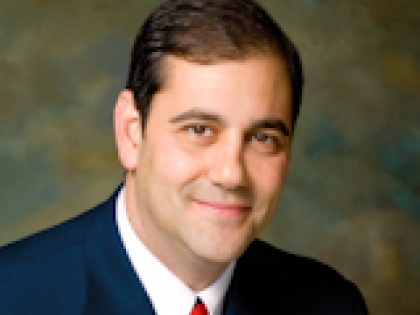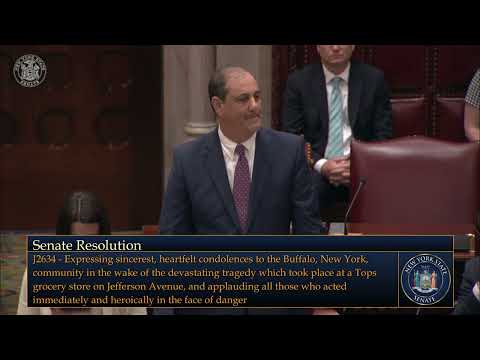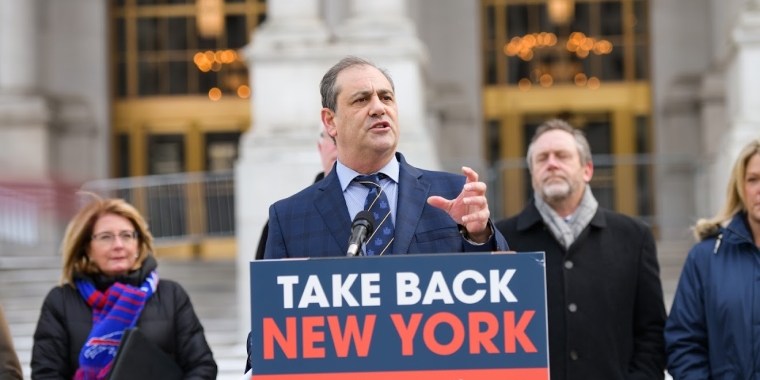
Senate Passes Measures To Combat Sex Trafficking Of Children And Increase Community Protections From Sexual Predators
May 11, 2018
-
ISSUE:
- Child safety

Senator Lanza, Chairman of the Senate’s Codes Committee, said, “Sex trafficking of a child is a growing problem in our nation and state. This bill makes it easier for prosecutors to bring charges against those who prey on children. I am proud to sponsor this bill that will hold criminals accountable for the disgusting and heinous crime of enslaving children for commercial sex. Today’s passage of this bill expands upon the Trafficking Victims Protection and Justice Act that I authored in 2015. Our state has been a leader in treating victims of human trafficking as just that – victims, and this bill addresses this horrible exploitation of human beings head on. I look forward to working with Assemblymember Amy Paulin as she works to pass both of these bills in the Assembly.”
Dozens of Bills Acted Upon Today Help Close Dangerous Loopholes, Increase Sex Offender Restrictions, Improve Public Notification
The New York State Senate today passed a package of critically important bills to strengthen laws that will help put an end to the sexual exploitation of children and prevent recurrences of sexual abuse through increased training, enhanced public awareness, and additional restrictions on convicted sexual predators.
Stopping the Sexual Exploitation of Children:
Sex trafficking continues to be a scourge in communities across the state, and is especially damaging to the safety and well-being of children. In 2015, New York strengthened its criminal justice response to trafficking by increasing the accountability of traffickers, patronizers, and other exploiters, while providing necessary protections for victims. However, the law did not go far enough in helping to prevent the prevalence of the sexual exploitation of minors by holding traffickers more accountable for the devastating impact they have on the lives of children they abuse.
Unlike federal law, New York law requires that the prosecution must prove force, fraud or coercion was used in order to find a person guilty of sex trafficking, even if the child is under 18. While the state has long recognized that children do not have the legal, psychological, or emotional capacity to consent to sexual activity, it is increasingly difficult to prosecute traffickers for more serious offenses of their crimes. As part of their exploitation, they may seek to bond with their young victim to confuse the victim into thinking they are committing the forced sexual acts out of love, and not due to a threat of violence or other coercion.
The bill passed today (S5988A), sponsored by Senator Andrew Lanza (R-C-I, Staten Island), creates a critically needed criminal charge of sex trafficking of a child -- eliminating the need to prove force, fraud, or coercion where a child under 18 engages in commercial sex.
Senator Lanza, Chairman of the Senate’s Codes Committee, said, “Sex trafficking of a child is a growing problem in our nation and state. This bill makes it easier for prosecutors to bring charges against those who prey on children. I am proud to sponsor this bill that will hold criminals accountable for the disgusting and heinous crime of enslaving children for commercial sex.”
In addition, the Senate passed S7836, also sponsored by Senator Lanza, that will help expand the availability of the Human Trafficking Intervention Court (HTIC) Initiative to reach more victims in more communities. The Courts were created to provide alternatives to incarceration for people arrested on prostitution charges, since many of the defendants were also victims of human trafficking. Currently, however, four of the six HTIC courts outside of New York City lack jurisdiction to see cases that originate outside of the local criminal courts where they are physically situated. This bill expands that jurisdiction so that more victims would be eligible to receive the crucial services that are appropriate for their individual situations, including counseling, job training, education, housing, and medical treatment, among others.
Senator Lanza said, “Today’s passage of this bill expands upon the Trafficking Victims Protection and Justice Act that I authored in 2015. Our state has been a leader in treating victims of human trafficking as just that – victims, and this bill addresses this horrible exploitation of human beings head on. I look forward to working with Assemblymember Amy Paulin as she works to pass both of these bills in the Assembly.”
Preventing Child Abuse in Educational Settings
A bill (S7372B), co-sponsored by Senators Patrick Gallivan (R-C-I, Elma) Chris Jacobs (R-C-I, 60th District) and Michael H. Ranzenhofer (R-C-I, Amherst), expands the types of educational settings required to report child abuse and increases the professions required to receive training to identify and report abuse.
Under current education law, private schools are not included in requirements to report child abuse in an educational setting, potentially putting students attending private schools at a greater risk. This new bill requires allegations of abuse at private schools, as well as charter schools, state-supported and state-operated schools, Special Act School Districts, and boards of cooperative educational services (BOCES), be reported directly to law enforcement.
It also expands the responsibility for reporting abuse allegations to include therapists, speech-language pathologists, teacher aides, school resource officers and any employee who contracts with a school to provide transportation to children. The legislation further amends education law to require that all teachers and administrators employed by a private or charter school to complete two hours of training regarding the identification and reporting of child abuse.
Senator Gallivan said, “As a state, we have an obligation to protect all children from abuse. Teachers, school employees and others in positions of power who abuse students must be held accountable, regardless of the educational setting. No school – public, private or charter - should be exempt from the requirement that allegations and instances of abuse be reported to the proper authorities.”
Senator Jacobs said, “We need to protect our children while in school, no matter the age, no matter public or private, and we need to make it law that the adults charged with caring for our children must report allegations of abuse to the proper authorities.”
Senator Ranzenhofer said, “This loophole in state education law must be closed. No school should be excluded from child abuse reporting requirements. I am pleased that the legislation is advancing with passage today in the State Senate, and I am hopeful that the State Assembly will follow our lead.”
In addition, the Senate acted upon the following bills to make communities safer from convicted sexual predators and other criminals:
S33, sponsored by Senator Martin Golden (R-C-I, Brooklyn), ensures that young children are not being cared for by felons with a history of serious crimes including sexual abuse of children. This legislation requires the Office of Child and Family Services (OCFS) to deny the license or employment application if a background check reveals any felony convictions in New York State or any other jurisdiction for a sex offense, a crime against a child, a crime involving violence, or if a conviction for a felony drug-related offense occurred within the past five years.
S249, sponsored by Senator Rob Ortt (R-C-I, North Tonawanda), allows law enforcement to disseminate information about a Level 2 sex offender’s employment address to vulnerable populations. Currently, Level 2 offenders’ employment addresses are included in the online Sex Offender Registry, but law enforcement is only allowed to notify schools and other vulnerable populations of the offender’s residence.
S296, sponsored by Senator Joseph Robach (R-C-I, Rochester), requires Level 3 sex offenders who have been convicted of violent crimes against children to wear an electronic monitoring device for life. The bill would also require the cost of the monitoring device to be absorbed by the sexual offender – not the state or local municipality.
S399, sponsored by Senator Ortt, creates a definition of residence under the Sex Offender Registry Act. It would be defined as any place of abode, domicile, or inhabitance where a convicted sex offender spends or intends to spend more than two days a week – closing a longstanding loophole that allows sex offenders to move around without being properly tracked.
S962, sponsored by Senator Rich Funke (R-C-I, Fairport), expands access to information about all registered sex offenders available on the DCJS website to expand the utility of the registry and enhance the safety of New York's most vulnerable citizens.
S1006A, sponsored by Senator Robach, requires sex offenders to register a change of address and internet accounts no later than three days after the change. The legislation also requires local law enforcement to submit all changes of address and internet access provider forms to the registry.
S1009, sponsored by Senator Robach, prohibits Level 3 sex offenders from living in college housing. College students on-campus generally live in very close quarters on their own for the first time. This measure takes into account that their safety could be compromised when sharing a living space with people they do not know anything about.
S1635, sponsored by Senator Golden, requires employers, organizations, and government entities to complete a background check against the state’s Sex Offender Registry for all prospective employees and volunteers if their jobs include substantial contact with children. By updating existing law, sex offenders would be prohibited from working or volunteering with children in child care, recreational, entertainment, and other similar settings.
S1981, sponsored by Senator Gallivan, requires the Office of Children and Family Services (OCFS) to determine and then notify the appropriate local child protective services if a subject of an allegation of child abuse of maltreatment is the operator of a licensed or registered childcare facility or any similar facility that received funding under the block grant for childcare. The notification will take place at the time OCFS transmits the report of suspected child abuse and will also include any person, if named as the subject of a report, is a known sex offender or has previously been subject of an indicated report of abuse or neglect.
S2132, sponsored by Senator Gallivan, requires the state to notify government officials and school leaders when sex offenders are transferred from a state facility to a community program or residence in their municipality. Notification must take place no later than 10 calendar days prior to the transfer.
S2170, sponsored by Senator Sue Serino (R-C-I, Hyde Park), closes a dangerous loophole that allows convicted sex offenders to be employed in positions that give them unsupervised access to residential properties – positions that include the roles of property managers and building supervisors. This legislation would close the loophole by specifically prohibiting an individual who is a convicted sex offender from working or volunteering in a position where they would that access.
S2595, sponsored by Senator Ranzenhofer, amends current law to find any person who knowingly harbors, houses or employs a defaulting sex offender and who fails to contact law enforcement regarding the offender is guilty of a Class A misdemeanor.
S2600, sponsored by Senator Lanza, prohibits convicted sex offenders from operating automobiles participating in mobile application-based transportation networks (such as Uber and Lyft), or from being employed by such transportation networks.
S2638, sponsored by Senator Lanza, requires Level 2 sex offenders to appear in person at a law enforcement agency every year. This measure would help law enforcement confirm that the offender is located at the address previously given and that their appearance has not significantly changed.
S3030A, sponsored by Senator Pam Helming (R-C-I, Canandaigua), increases penalties for the failure of a sex offender to register or follow the standards of the Sex Offender Registration Act, work on an ice cream truck, mobile food service establishment, or pushcart to a Class D felony.
S4593A, sponsored by Senator Ortt, prohibits registered sex offenders from receiving treatment from any facility operated by the state providing non-emergency outpatient or inpatient psychiatric treatment that is operated in the same building as a state-operated children’s psychiatric center.
S6420, sponsored by Senator Elaine Phillips (R-C, Manhasset), ensures that victim and witness statements made to authorities regarding sexual abuse remain private and are not subject to disclosure to the general public through the Freedom of Information Law (FOIL). Victims of sexual abuse, as well as witnesses, are often reluctant to disclose abuse because they fear, among other things, embarrassment and retaliation for reporting it to the authorities. Making their reports publicly available and viewable by the media, sexual predators, and cyberbullies would potentially deter them from reporting abuse.
S6548, sponsored by Senator Terrence Murphy (R-C-I, Yorktown), provides that information on a sex offender from another state who has not been assigned a risk level in New York may be disclosed as if he or she was a Level 1 or 2 sex offender.
S2173, sponsored by Senator Serino, requires all sex offenders to verify their residence and registration with the state Division of Criminal Justice Services on a biannual basis. Under current law, Level 3 sex offenders must verify their registration every 90 days, but Level 1 and 2 offenders are only checked on once a year with a verification form on their anniversary of registration. This bill would not only increase the amount of times that all sex offenders have to verify their registration, but would also send the verification forms to each offender on a different random date.
S1014, sponsored by Senator Robach, would establish the Sex Offender Public Awareness Program to help enrich outreach in schools, community groups, and clergy on the important issue of sex offenders being released back into society. The public awareness program would be operated at the local level, and would require the board of the potential program to make annual reports to the Governor and the Legislature on its work.
S5201, sponsored by Senator Thomas Croci (R, Sayville), extends the duration of the registration requirement for Level 1 sex offenders who were 21 or older at the time of their offense from 20 to 30 years. The bill would also allow local governments to adopt laws placing reasonable restrictions on where a sex offender is permitted to live in their community – a response to a recent New York State Court of Appeals decision that overturned all local residency restrictions pertaining to where a registered sex offender can live.
S248, sponsored by Senator Ortt, prohibits any sex offender from residing within a quarter mile of any school, playground, park, or building in which child daycare is provided, in an effort to protect New York children and other citizens who spend significant amounts of time at these safe havens.
S968, sponsored by Senator Murphy, prohibits sex offenders from residing within 1500 feet of the residence of their victim. This bill would help protect victims and their families from having to bear the burden or costs of moving because their offender moved back into their neighborhood, and prevent victims from having to tolerate the emotional distress caused by coming into contact with their abuser.
S5348, sponsored by Senator Murphy, restricts Level 3 sex offenders from working within 500 feet of any school or day care facility. Under New York law, Level 3 sex offenders are classified as the most dangerous of all sex offenders, and with a high risk of recidivism. This bill would add greater protection for New York children by placing them a safe distance away from the highest level offenders.
S3027, sponsored by Senator Ranzenhofer, prohibits registered sex offenders from residing in community residences in an effort to protect those with mental disabilities. Under current law, registered sex offenders are permitted to reside in facilities operated by or subject to licensure by the Office of Mental Health or the Office for People with Developmental Disabilities. This bill would put a stop to that by protecting New York’s most vulnerable individuals by keeping them separate from those who have committed sex crimes.
S6189, sponsored by Senator Lanza, would prohibit sex offenders released on parole or sentenced to probation from entering public, association, or free libraries. The bill would help protect children and families from worrying about their safety when entering a place of learning and community activities.
The bills have been sent to the Assembly.
Share this Article or Press Release
Newsroom
Go to Newsroom
Late Budget 2022-2023
April 6, 2022


